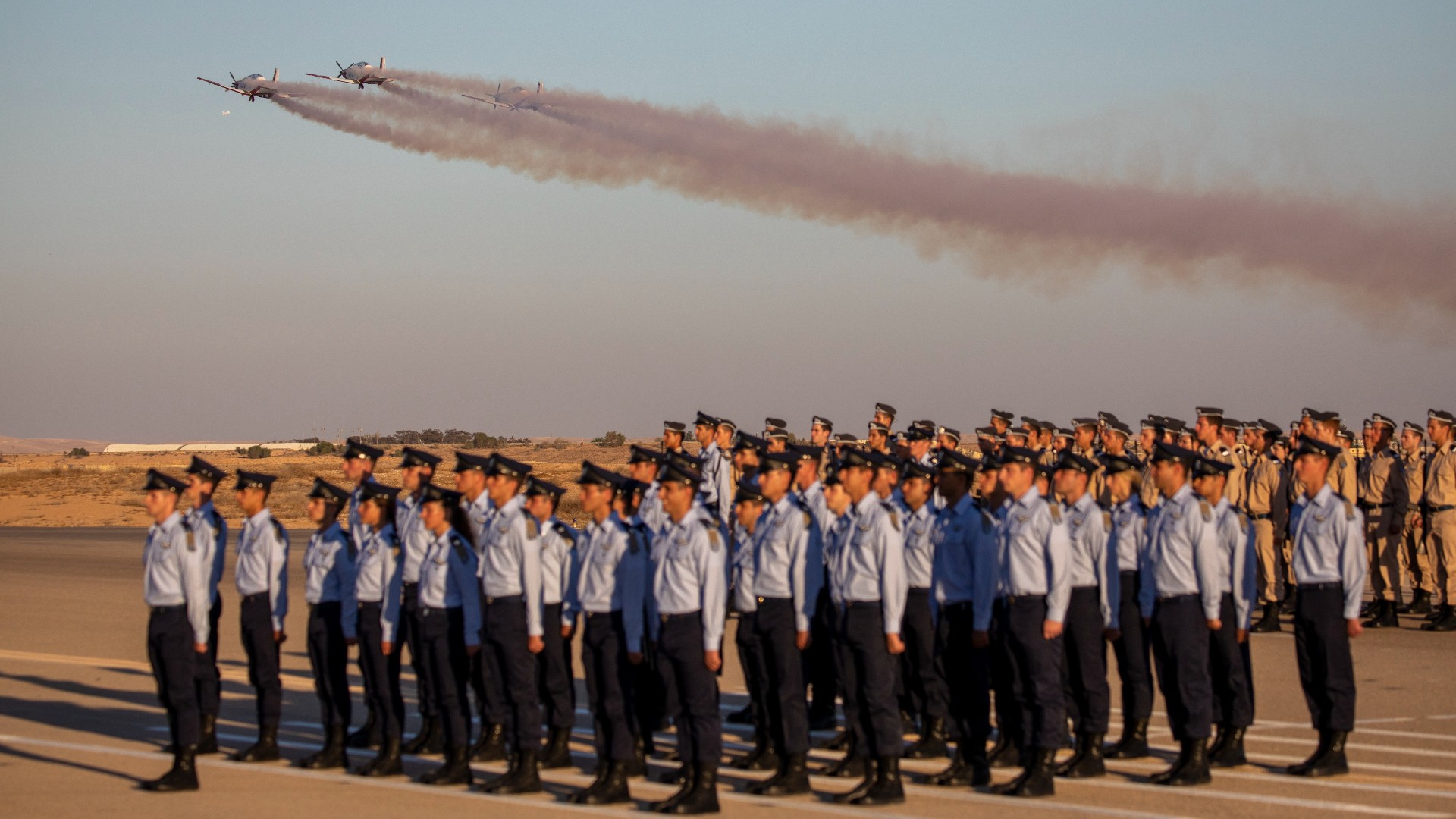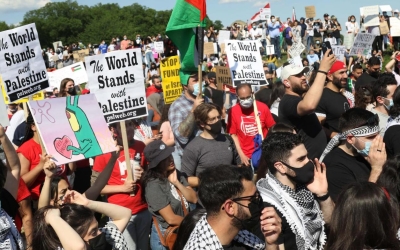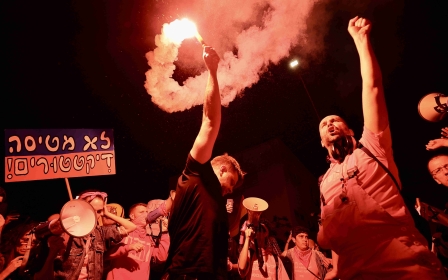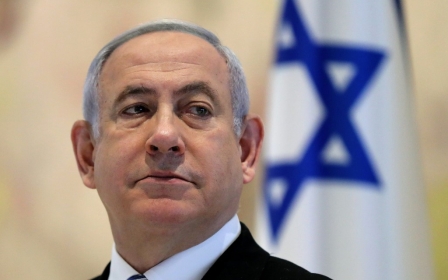No air force, no Israel: Why the fighter pilots' protest is an existential issue
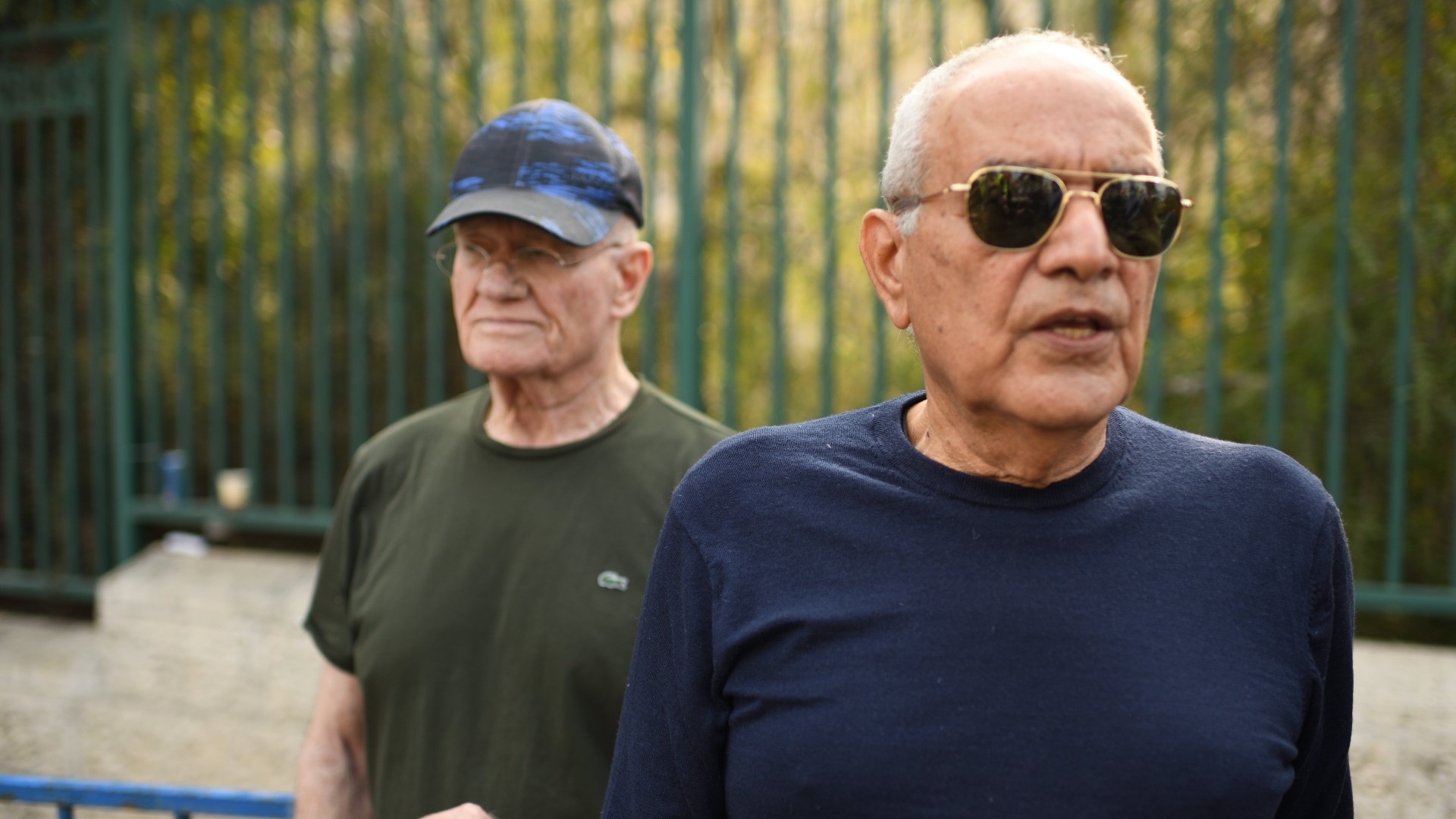
For decades, Israelis have been telling themselves that the army owns the country. Sometimes it was said as a joke. Sometimes, as a perceived reflection of reality.
But since protests erupted against the government's controversial judicial overhaul plan more than ten weeks ago, the perception of army institutions among many Israelis has drastically changed.
From once being viewed as cherished heroes, army units are now routinely vilified by supporters of Prime Minister Benjamin Netanyahu's government and officials from his ruling coalition.
It's a first, but so is the involvement of soldiers in mass protests.
It began two weeks ago, when 37 out of 40 reservists in Squadron 69 - an elite Israeli air force unit - announced they would not turn up for training in opposition to the government's judicial overhaul plan.
New MEE newsletter: Jerusalem Dispatch
Sign up to get the latest insights and analysis on Israel-Palestine, alongside Turkey Unpacked and other MEE newsletters
The squadron - known as the Hammers - has been crucial to Israel's security, carrying out hundreds of strikes against Iranian targets in Syria in recent years, including the 2007 raid on Syria's nuclear reactor.
Historically, the army and its various divisions have held a lofty position in Israeli society, where they are viewed as one of the country's most trusted state institutions. They're held in such high regard that the government views the lives of soldiers as more valuable than the lives of the civilians they are there to protect.
So, the decision by Squadron 69 to join tens of thousands of protesters on the streets underscores the growing anger against the planned judicial overhaul, which critics fear could place the country under authoritarian rule and undermine checks and balances.
On Sunday, they were followed by 180 reservist pilots, navigators and other air force crew announcing they would not show up for their weekly training this week. Unlike their predecessors, whose similar statement referred only to the future, this unprecedented decision applies immediately.
They didn't mince their words. Many of them have openly admitted they intend to spend the time that they would be training protesting instead. One of the pilots wrote to his commander: "The coming weeks are critical in terms of the pending regime change. From my point of view, taking part in any attempt to stop this process is where my contribution to the state and its security is now most needed.”
What started with 37 pilots, who changed the track and mood of the protest, is now turning into an avalanche of hundreds. Reservists from other units, including Unit 8200, an Israeli intelligence corps unit, have also threatened to not turn up for duty.
Meanwhile, reservists and veterans from the Golani combat infantry brigade have announced their refusal to serve as long as the "dictatorship legislation" continues.
Reservists from other elite formations, such as the Flotilla 13 naval commandos and the air force's Shaldag special forces unit have also said they will either refuse call-up orders or cease volunteering extra time.
Days ago, Defence Minister Yoav Galant of Netanyahu's Likud party called the dissenters "a real threat to Israel's security". But as their numbers grow, his tone has changed, and on Monday he threatened to resign if no compromise is reached. He reportedly warned the prime minister that the military is on the verge of breaking apart.
No air force, no Israel
It's worth noting that never in Israel's history has the military intervened in the country's political process and never with the air force leading in that role, though several army chiefs have entered politics after retirement.
Neri Yarkoni, a retired colonel and combat pilot for over 30 years, told Middle East Eye that the actions of the 37 pilots were a major turning point for the protest movement.
"Israel does not have that many fighter pilots. Unlike in other Israeli army units, almost all of the pilots are reservists and not young soldiers performing a mandatory service,” he said.
'The Israeli air force can attack Iran without Squadron 69, just as FC Barcelona can play without Messi. It just won't be the same'
- Neri Yarkoni, retired colonel
"The 37 pilots from Squadron 69, certainly the 'top' squadron, represent a wide mood among air force reservists. Everybody understands that without them, there is no air force and without the air force, there is no Israel."
Yarkoni added that while the reservists have said they would take part in combat operations if needed, their absence could nonetheless affect Israel’s ability to carry out raids beyond the Gaza Strip and Syria, places where Israeli warplanes are most often used.
"The Israeli air force can attack Iran without Squadron 69, just as FC Barcelona can play without Messi. It just won't be the same," he said.
If half of Israel's fighter pilots are refusing to serve and a threat from beyond emerges - say, Iran - Yarkoni warns that the Israeli military simply won't be able to cope. "No pilots, no state of Israel,” he says.
Omer Bar-Lev is a retired colonel and former commander of Sayeret Matkal, the special forces unit that Netanyahu once served in. Until recently, the Labor Party MP was also the public security minister. He shares Yarkoni's apocalyptic outlook.
“Israel’s right to exist is based on a strong army and the support of America based on a set of shared values,” he tells MEE. “With those factors gone, we are steps away from the breakdown of Israel."
Bar-Lev believes damage to the functioning of the military is unavoidable.
"In my long military service, I sometimes had qualms about the nature of my mission, more specifically if it serves some hidden political agenda. I could live with it knowing that basically, whoever was then leading the country was motivated by security needs of the state only," he said.
"This is not the case now. To be able to perform these kinds of duties wholeheartedly, trust is crucial to performance. Even the compulsory service, without a sense of identification, will harm the army’s ability to function. With a damaged army, there is no state of Israel.”
In light of the verbal attacks on the army, several veterans have lashed out at right-wing politicians who have dodged their mandatory military service. Out of the 64 members of the ruling coalition, only 24 have served in the army.
The former head of military intelligence, Major General Amos Malka, told a group of protesters in Jerusalem earlier this month: “We are not suckers – we won’t let people who do not serve in the army dictate to us the kind of country we live in. Stop the legislation or we’ll stop the country."
This seems to be the prevailing mood among most military figures.
At a ceremony paying tribute to army reservists on 12 March, Israeli army chief of staff Herzi Halevi said: "The Israeli army cannot function without the reservists; their readiness to serve depends on it remaining 'people's army'."
In recent weeks, retired Colonel Shaul Arieli warned that the language directed at dissenting reservists could impact those in mandatory service.
"These are young men and women and the current atmosphere may easily affect their motivation to join combat units or attend officers' training," he told MEE.
"When they (children) see grownups refusing to serve as reservists, they are bound to see it for what it is: an expression of distrust in the system."
'Halfway to a military coup'
Anger has also been brewing since Bezalel Smotrich, who in addition to being finance minister is responsible for Israel's civil administration in the occupied West Bank with a portfolio in the defence ministry, said Israel should "wipe out" the Palestinian village of Huwwara.
Late last month, hundreds of Israeli settlers attacked Palestinian towns and villages in the occupied West Bank near Nablus, following a shooting that killed two Israelis in Huwwara.
In the rampage on Huwwara and other Palestinian villages, one Palestinian was killed and nearly 400 were wounded.
Yarkoni, who said he refused to drop a cluster bomb on a Lebanese village in 1982, said dissenting voices in the army would struggle to find sympathetic shoulders to lean on, given the political climate.
Yarkoni was not reprimanded by his commanding officers, following his refusal, and said he received a tap on the shoulder from commanders and colleagues.
'Enemy countries now see Israel as a spider web falling apart without their intervention'
- Dan Halutz, former military chief of staff
"Once this government makes wiping out Huwwara legal, I won't be there and the same with many other pilots," he said.
On the other hand, Major General Gershon Hacohen, who served as commander during the 2005 Gaza pullout, openly objected to the pilots’ behaviour, calling it "pure extortion" and "halfway to a military coup".
"What is a military coup if not them using the power they hold as a unique entity that cannot be replaced?" he asked.
"There are only a few hundred of them. With the huge investment in each one of them comes big responsibility. They abuse their power."
Many analysts have compared the current situation to that of the 1973 October war. While the background is starkly different, the main source of similarity is the crisis of trust between the leadership and the people, at least among half of the public.
Then, the army emerged as the saviour. Now it's the enemy for some.
"Enemy countries now see Israel as a spider web falling apart without their intervention," said former chief of staff and commander of the air force, Dan Halutz.
"Nobody can tie a pilot to a chair and make him fly."
Middle East Eye delivers independent and unrivalled coverage and analysis of the Middle East, North Africa and beyond. To learn more about republishing this content and the associated fees, please fill out this form. More about MEE can be found here.


